Key takeaways:
- Military records offer profound insights into the personal lives and emotional landscapes of ancestors, connecting us with their experiences and sacrifices.
- Different types of military records, such as enlistment, service, and pension records, provide valuable information that helps build a deeper understanding of a soldier’s life and post-service impact.
- Accessing military records can be done through the National Archives, various genealogy websites, and local archives, providing diverse resources for researchers.
- Analyzing military records reveals hidden stories and connections, enriching our understanding of family history and the broader context of historical events.
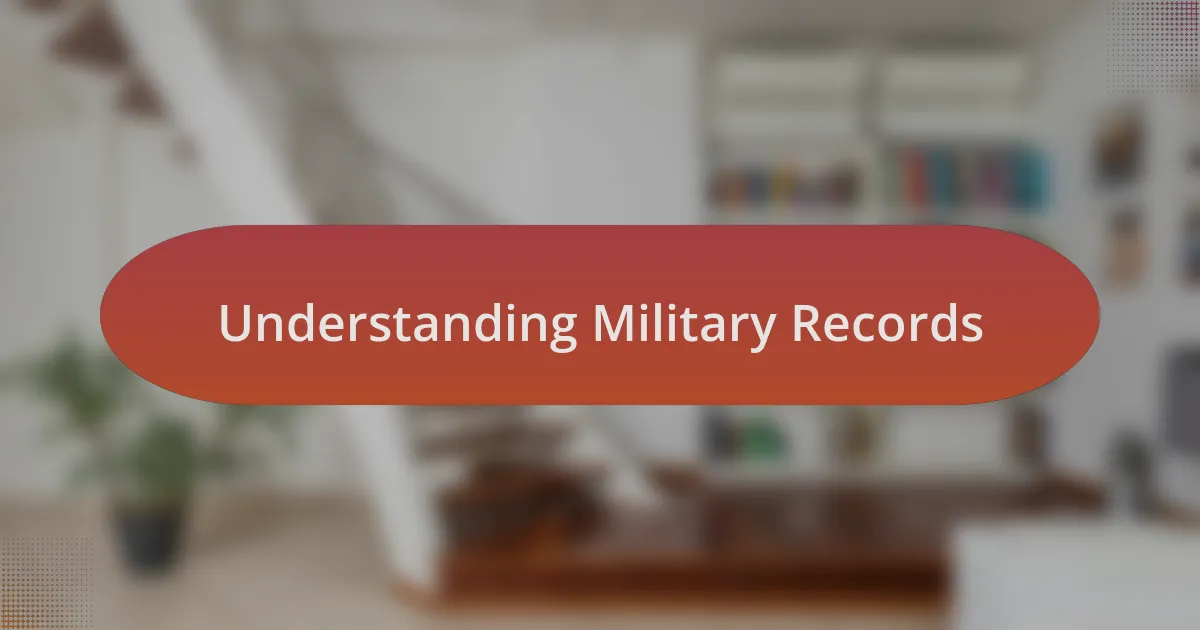
Understanding Military Records
Military records serve as a treasure trove of information about our ancestors. I remember the thrill I felt when I uncovered a dusty service record that revealed not just my great-grandfather’s military rank but also details about his unit’s deployment during a pivotal battle. It made me wonder how many families have similar stories, waiting to be unearthed in the stacks of archival material.
One of the fascinating aspects of military records is their ability to convey the humanity behind the uniform. Take, for instance, the personal letters or journals that sometimes accompany these records. They provide insight into the soldier’s thoughts and feelings, allowing us to connect on a deeper level. Can you imagine how your ancestor felt during those tumultuous times? These personal touches make the past feel so much closer and more relatable.
As you explore military records, you’ll encounter a variety of documents—from enlistment papers to discharge forms. Each one can shed light on different facets of a soldier’s life. It’s interesting to think about what these papers represent: a promise made, a service rendered, and a life impacted by war. Have you ever considered how these snippets of history might help shape your family’s narrative? The journey through military records can truly be transformative, enriching your understanding of those who served.

Importance of Military Records
Military records are crucial for piecing together not just facts, but the emotional landscapes of our ancestors’ lives. I still recall the moment I discovered my uncle’s service record; it included a mention of his efforts during a humanitarian mission. This detail illuminated his character in ways I’d never imagined, making me appreciate the complexities of his experience.
Beyond the basics of rank and deployment, military records often reveal family dynamics and personal sacrifices. For example, a simple discharge paper can serve as a reminder of the loved ones left behind, the fears faced, and the determination shown. How often do we overlook the profound impact these experiences have on family stories? In my case, learning about my ancestor’s journey opened a door to understanding the values that shaped my family’s history.
These records provide not only a glimpse into the past but also a connection to the present. They can spark questions that resonate today: What bravery did my ancestors demonstrate? How did their service shape the community I live in now? Each record I discover adds layers to my identity, making it easier to feel connected to the larger narrative of history.
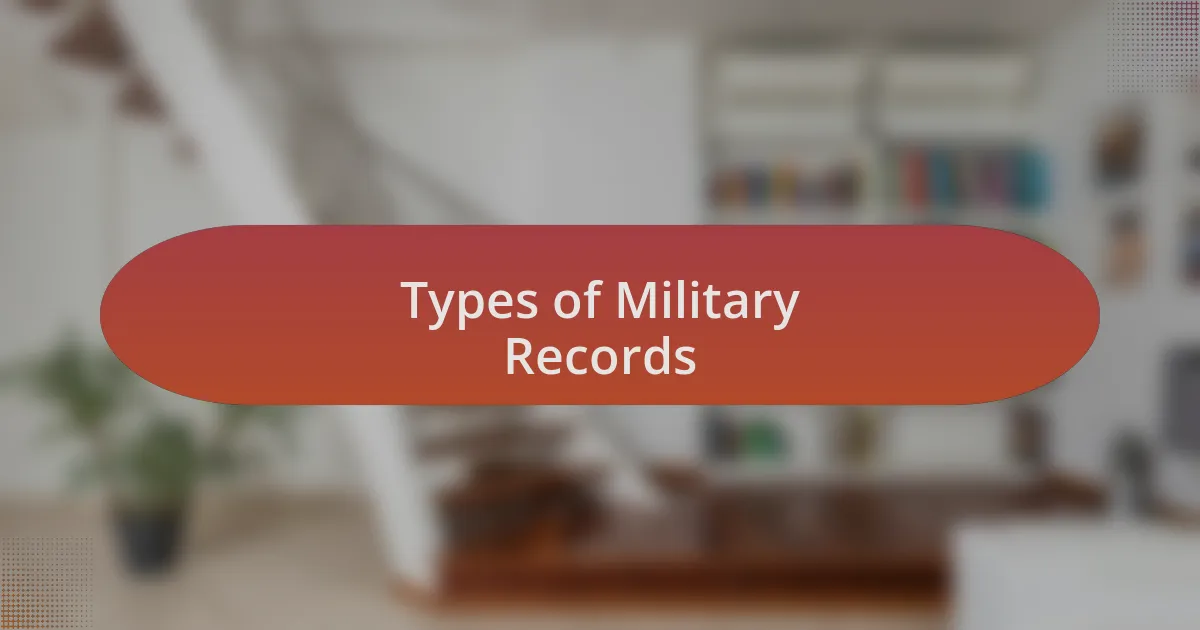
Types of Military Records
Military records come in various forms, each illuminating different aspects of a soldier’s life. For instance, enlistment records often detail the circumstances under which a person joined the armed forces. I remember when I stumbled upon my grandfather’s enlistment paper; it not only stated his age and reason for service but also reflected a difficult economic situation that pushed him to join. It made me question how many others faced similar choices during tougher times.
Another important type is service records, which catalog a soldier’s assignments and commendations. These documents can be treasure troves of information, revealing not only where my relatives were stationed but also their roles in significant historical moments. I discovered that my great-uncle earned a medal for bravery during a battle I had never heard of, deepening my respect for him and the courage it must have taken to serve under such circumstances.
Lastly, pension records provide a window into the aftermath of military service. They indicate how service impacted the lives of veterans and their families, often shedding light on financial struggles and health issues. When I accessed my ancestor’s pension file, I found queries about his wellbeing and how his service affected his family. It was a poignant reminder that the implications of military service extend far beyond the battlefield. How many stories remain untold when we neglect these valuable resources?
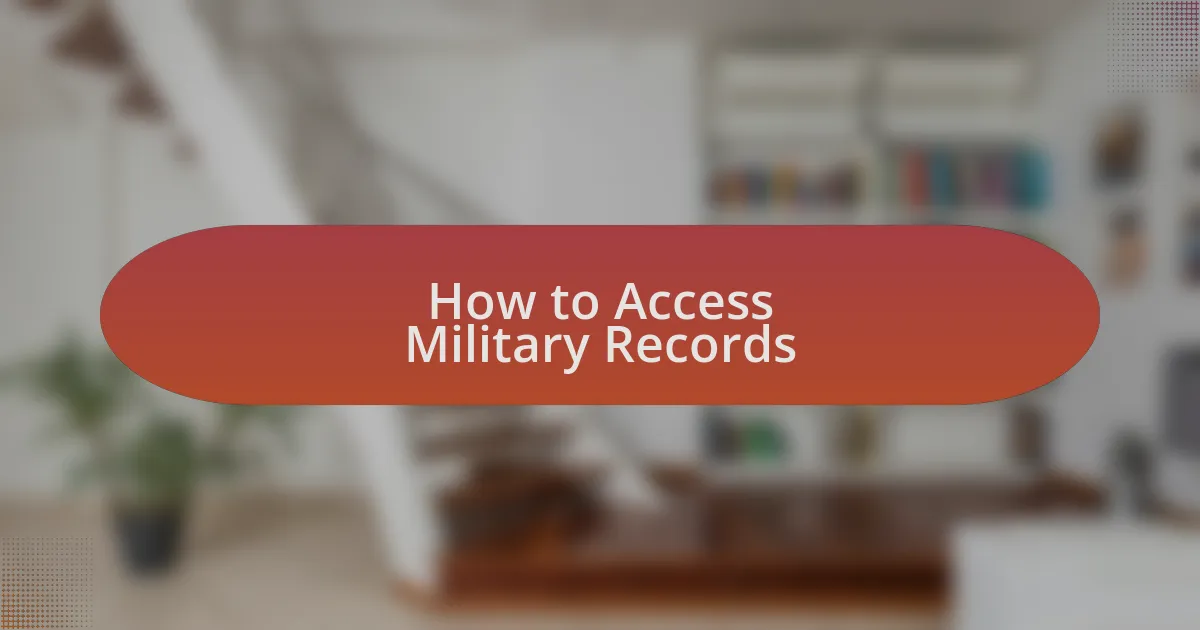
How to Access Military Records
Accessing military records can seem daunting, but there are several pathways to uncover these historical treasures. One effective method is to visit the National Archives, either physically or online, where many records are digitized and available for public viewing. I recall the excitement I felt when I navigated their website, unearthing my great-grandfather’s service details with just a few clicks.
Another avenue is through various military organizations and websites dedicated to genealogy. Websites like Fold3 or Ancestry.com often house expansive military databases. I once found a heartfelt letter among the files of a distant relative, providing insights not just into his military service but also revealing a side of him I had never known—the personal struggles he faced even during wartime.
Don’t overlook local records, too. Many states and counties maintain archives with military records specific to their region. During my search, I visited a local historical society and discovered a scrapbook lovingly put together by a veteran’s family, filled with scraps and letters. It struck me how such small, personal collections can hold incredible stories waiting to be shared. Isn’t it fascinating to think about what you might discover with just a little effort?
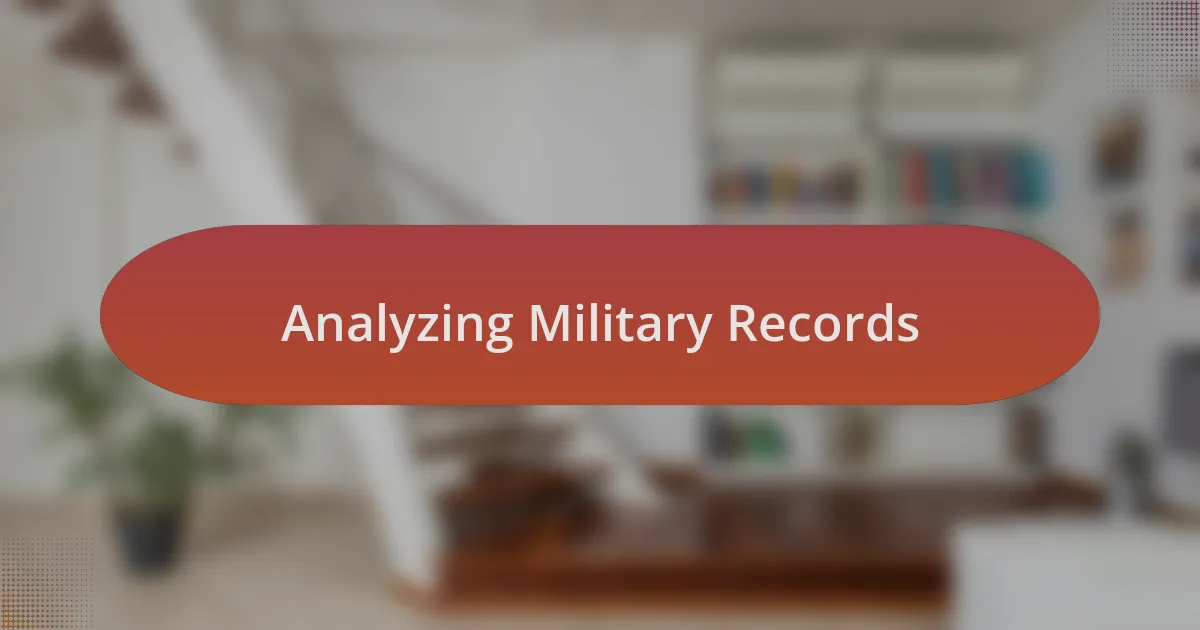
Analyzing Military Records
Analyzing military records goes beyond simply reading names and dates; it allows you to step into the shoes of your ancestors. I remember the first time I scrutinized my grandfather’s enlistment papers. Each handwritten detail revealed not just his age and birthplace, but also the socio-economic factors influencing his decision to join during World War II. It made me ponder—how many lives were shaped by that single choice?
As you dig deeper, pay close attention to the annotations and stamps on documents. These little nuances can unveil hidden stories, like the 1943 letter I stumbled upon that contained a note about my great-uncle’s commendation. It wasn’t just recognition; it also shed light on the camaraderie among soldiers during a particularly trying campaign. Have you ever considered how even the smallest notation can open a window into the past?
Moreover, I found that cross-referencing military records with census data enriched my understanding of the family’s transition after service. One vivid example was how I learned from old service records about my great-great-grandfather’s promotion and then connected those dots to his eventual role in local politics. Reflecting on these connections, I often ask myself—how did the military experience influence their lives outside of service? Each record is a piece of a much larger puzzle.
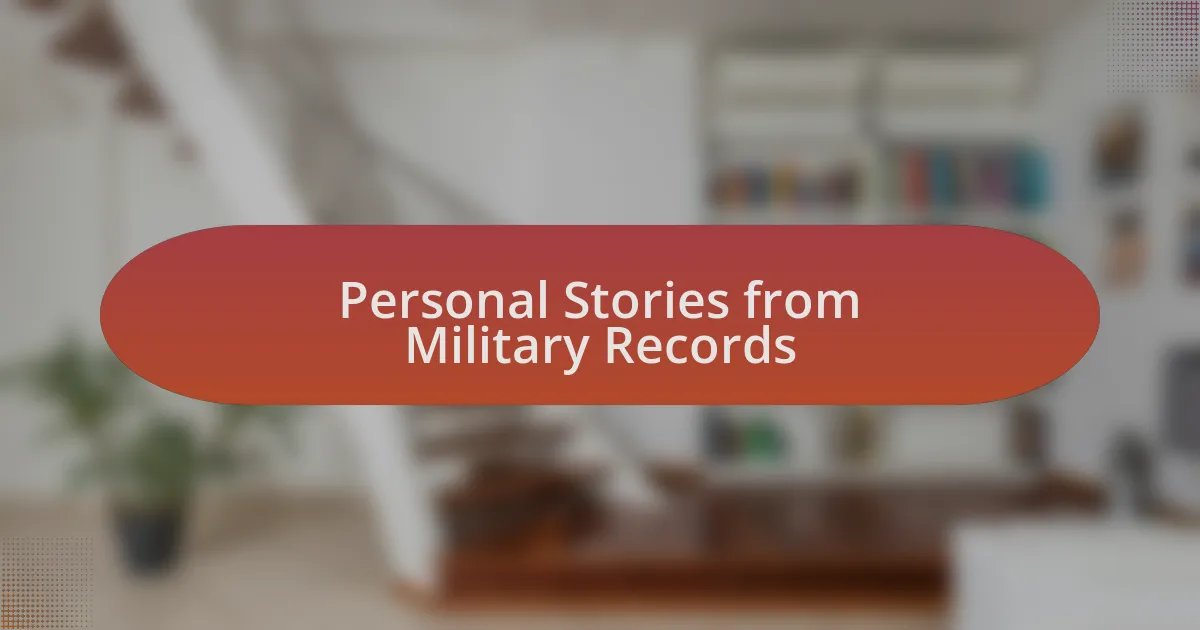
Personal Stories from Military Records
My journey through military records led me to a touching discovery about my great-uncle, who served in the Korean War. In his discharge papers, I found an old photograph tucked away, capturing a fleeting moment of joy amidst the chaos. It was a candid shot of him celebrating with fellow soldiers after a successful mission, and it sparked a flood of questions—what were they celebrating? How did these experiences shape their bonds? It reminded me that behind every uniform lies a personal story filled with emotion.
While sifting through service records, I stumbled upon a series of letters my grandmother exchanged with my grandfather during World War II. These letters, often filled with longing and hope, painted a vivid picture of their relationship amidst uncertainty. I can still feel the weight of her words when she mentioned the moonlight’s glow was the only thing connecting them across the miles. How powerful it is to know that even in the darkest times, love can shine through, weaving a narrative that ties us to our history.
Another surprising revelation came when I analyzed the medical records of my great-great-uncle, who was wounded in battle. Alongside the clinical jargon of treatments and procedures, there were notes from nurses praising his bravery and resilience. I found myself reflecting on how such recognition was not just a testament to his spirit but also a reminder of the human stories that unfold in the backdrop of war—a poignant reminder that even in suffering, there is courage and strength. Have you ever thought about the voices hidden within these records, just waiting to be heard?
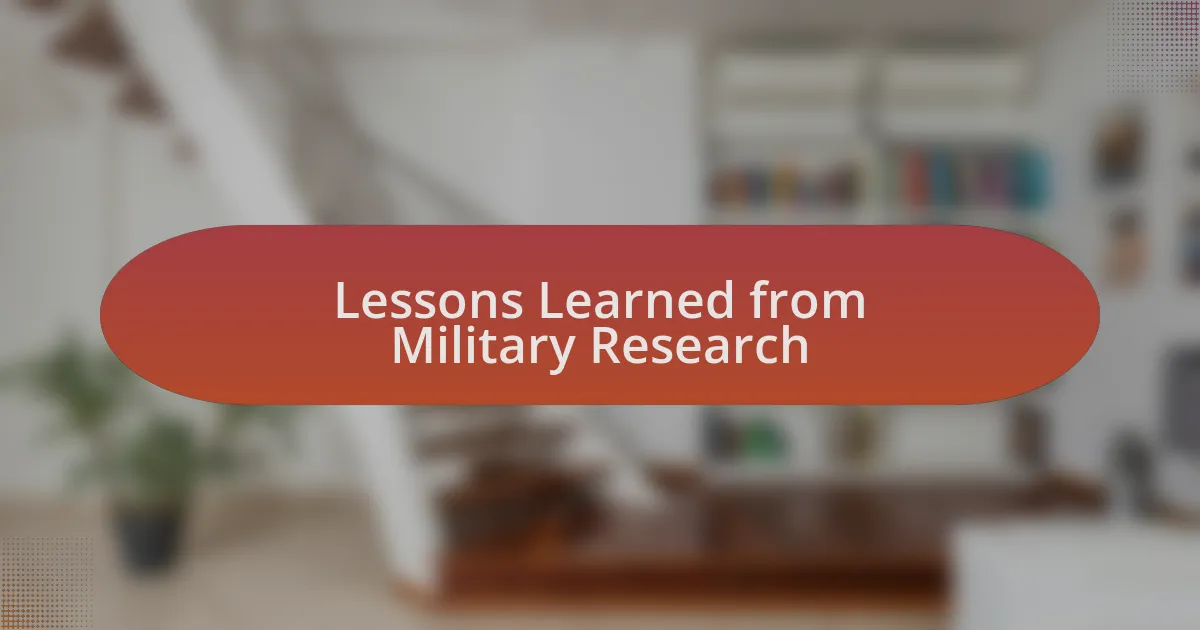
Lessons Learned from Military Research
Diving deeper into military research revealed the profound impact of camaraderie among soldiers. I came across a diary belonging to one of my ancestors who served in World War I, filled with accounts of daily life in the trenches. As I read his reflections on friendship forged in hardship, I couldn’t help but ponder—how many of us carry similar stories of connection that stem from shared challenges, even outside the battlefield?
One lesson that struck me was the sheer volume of personal sacrifice that is often unsung. Unearthing records of a distant relative who was a prisoner of war, I was stunned to find detailed accounts of his resilience. There were notes of his attempts to maintain morale despite adversity, which made me question the ways we honor everyday bravery. How often do we acknowledge the silent battles fought within ourselves and our families?
Additionally, I discovered how military records often serve as a bridge to understanding broader historical contexts. Researching a great-grandfather’s enlistment during World War II led me to learn not just about his personal journey, but the societal changes that took place during that era. It made me reflect on how history shapes our family narratives. What lessons might we draw from these stories to inform our understanding of the present?